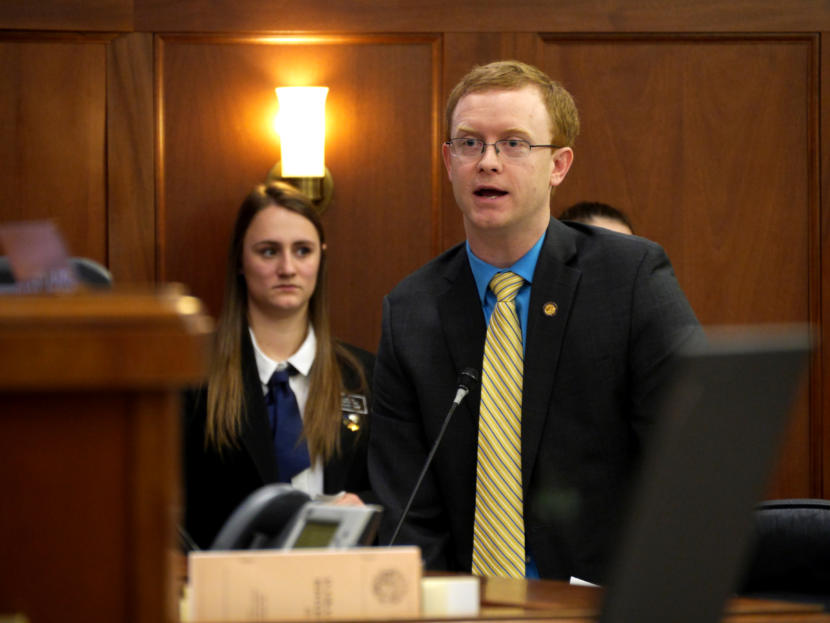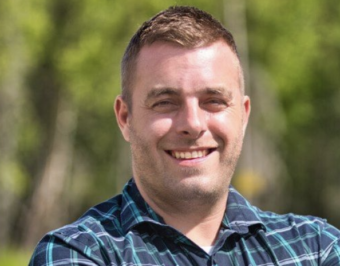
A showdown is brewing in a Mat-Su Valley Republican primary that could reshuffle the balance of power in Alaska’s Capitol.
The state House race centers on an incumbent, David Eastman, who is so polarizing that some lawmakers say he played a big role in blocking his own party from forming a majority in his chamber last year.
Eastman’s challenger is Jesse Sumner, a Matanuska-Susitna Borough Assembly member who also runs a successful home-building business.
Sumner, 36, said he’s voted for Eastman in the past, and he and his wife were writing him $500 checks as recently as last campaign season.
But while Sumner said he shares Eastman’s conservative values, he’s grown disillusioned by Eastman’s refusal to compromise.
Sumner said that keeps Eastman’s Mat-Su district from meaningful participation in the House’s debate about the direction of the state, and blocks Republicans from setting the agenda in Juneau.
“I believed in his principles as espoused. But I didn’t see any productive work toward those,” Sumner said in a phone interview. “He ends up isolating himself in the Legislature, even among members of his own caucus.”
Eastman, 39, doesn’t dispute that he’s often on his own in the House, and he’s been on the losing end of dozens of 39 to 1 votes.
But he said he has no interest in taking positions that are easy or convenient, even if the result is condemnation from his colleagues and the public.
In his four years in office, Eastman has been formally reprimanded by the House for suggesting that women in rural Alaska get pregnant so that they can get a free flight to a city for an abortion. He’s also proposed legislation to criminalize abortion. And he was the only vote against a 2017 bill commemorating Black soldiers who helped build the Alaska Highway.
“It would certainly be easier if I just went along with the majority, I give you that. It would be easier on me, it would be easier on my family,” Eastman said. “But that’s not what my district asked me to do.”
With two months until the primary election, the House race has already drawn attention from political observers statewide.

Last week, the influential anti-abortion group Alaska Family Action endorsed Sumner, saying that Eastman is ineffective and refuses to work with other socially conservative lawmakers on their legislation.
And rumors are swirling that left-leaning groups may even try to quietly boost Eastman’s campaign, knowing that his re-election could make it easier for the largely-Democratic House majority to remain in power.
“You have two strong conservatives, in a very conservative district,” said Ron Johnson, a local GOP leader. “And I think that this race is going to get the attention of the whole state.”
There are two main criticisms of Eastman from Sumner and others.
One is that he’s ineffective. Eastman’s abortion-related legislation hasn’t gone anywhere, and neither have his efforts to pay out a larger Permanent Fund dividend under the historical formula.
Eastman pointed out that he was successful in his push to repeal big pieces of a 2016 criminal justice overhaul, Senate Bill 91. The other issues are longer-term projects, he said.
“Juneau is not going to give up the PFD, and Planned Parenthood’s not going to give up abortion, without a very long war,” Eastman said. “Sometimes Juneau’s going to win, we recognize that. And you know what? Sometimes, as in the repeal of SB 91, try as they might, Juneau’s still going to lose — and we have to fight that fight.”
The second criticism of Eastman is that he refuses to work not just with Democrats, but with members of his own party, too.
Eastman has targeted incumbent Republican lawmakers that he deems not conservative enough, by recruiting and supporting GOP candidates running against them in primary races. And after the 2018 election, he refused to agree when his GOP colleagues chose Healy Rep. Dave Talerico to be the next House speaker.
Afterward, the narrow, 21-member majority claimed by Republicans fell apart, and a half-dozen centrist GOP representatives instead joined a new, mostly-Democratic majority.
“Some could argue that if it wasn’t for David Eastman, Democrats wouldn’t be in the majority,” said Fairbanks Democratic Rep. Adam Wool.
There were other factors and personality conflicts that undermined the Republican effort to organize the House, Wool said. But he and others said Eastman’s unbending views were one important dynamic.
That’s why Democrats or left-leaning groups could make a low-profile effort to defend Eastman, according to a number of Republicans.
Jim Minnery, president of Alaska Family Action, said the idea is “wildly speculative” but not out of the question.
“They think he’s one of the sticking points to getting Republicans to organize, because he’s such a lightning rod,” Minnery said.
While the Democratic candidate running against Eastman in 2018 got just 22% of the vote, the Alaska Democratic Party said in a statement that this year, it’s focused on the general election and its own candidate, Monica Stein-Olson.
“Monica Stein-Olson is a stellar candidate and a pragmatic moderate who we believe is a far better choice than either of the two far-right extremists vying for that seat,” the statement quoted Mindy O’Neall, the party’s coordinated campaign director, as saying. “We believe that Eastman and Sumner’s ideologies and styles fall far outside the Alaska mainstream view.”
Sumner, Eastman’s challenger, said that he’s focused on flipping the House back to Republican control.
That’s particularly important, Sumner said, because the GOP governor, Mike Dunleavy, has just two years left in his term. If the House changes hands, and a largely-Republican majority remains in power in the Senate, the GOP would control the governor’s office and both legislative chambers, making it easier for the party to set the agenda in Juneau.
If the Mat-Su’s conservative lawmakers can be more flexible, Sumner said, they’ll have a better chance of forming a House majority that reflects their views — even if that means they have to accept policies that may not completely align with their principles.
“I don’t think that I’m saying that I’m less conservative than David Eastman. I think what I’m saying is that I’m more realistic than David Eastman,” Sumner said. “The Valley can have input in the direction of the state, and you can move in a reasonable direction. Or the Valley can sit out, and this coalition of the Democrats and the center-right Republicans will direct the state.”
